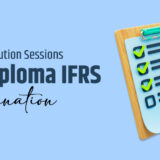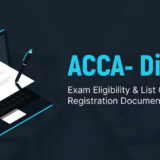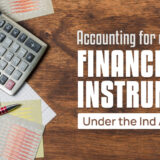
Thousands of accounting, audit and finance professionals apply for diploma in IFRS every year, and the biggest intimidation that a majority of them face is the preparation of DipIFR examination to crack it in the very first attempt. While lack of time for preparation and inability to focus on studies at a stretch are generally behind this pre-examination stress, the right guidance may help them determine their course of preparation and experience a surprising outcome.
DipIFR students typically come up with questions like how much time does it take to complete DipIFR syllabus before the examination, is it possible for non-CA professionals to get well versed with IFRS (International Financial Reporting Standards) within such a short time span and how many hours should be dedicated to DipIFR study on a daily basis. Aspirants are often concerned about the magnitude and complexity of syllabus. Despite being professionals in the field of accounting, finance and audit, most of these students feel the pressure of writing the exam paper and completing the same within just three hours!
We have been successfully running IFRS certification courses in Pune and are recently conducting online IFRS courses and DipIFR trainings. We have answers to all such queries and confusions. With years of experience in getting thousands of students prepared for DipIFR and other similar examinations, we take it as responsibility to discuss the tried, tested and proven strategies and effective study techniques that would help students overcome these and many other challenges. Although the approach is subjective and study technique may differ from person to person, we believe that the below pointers would help you identify the best suitable one for yourself before you start preparing.
- Finalising the date of exam and gathering study material
The date of examination is recommended to be decided well in advance, which would allow you for sufficient time to gather appropriate study material like books/e-books, coaching videos, and presentations. There are various options available for training videos in the market right from 60 hours to 120 hours of training. If you have prior knowledge of international financial reporting standards, you may opt for a 60 hours video. However, if you have no acquaintance with accounting standards, elaborate training videos may be the right choice for you. Books consist of questions and answers from past examinations and summary notes that assist with last-week revisions. It is imperative to select the training material provider wisely. We recommend learning partners of ACCA (Association of Chartered Certified Accountants).
- Completing entire syllabus within two months
If you have opted for training videos, it is important that you complete one view of training videos for entire syllabus within the first two months. Take out 2.5 hours daily, thrice a week (on weekdays) and 7.5 hours collectively (on weekends), which makes up to nearly 15 hours a week to meticulously attend video lectures. This way, you will possibly complete training videos in a span of about two months. We recommend that the study should begin with simpler and basic topics like IAS 1 – Presentation of Financial Statements, IAS 16 – Property, Plant and Equipment and other asset related topics. Moving from simple to complex will boost your sense of confidence that you are aware of the concepts and can easily complete entire syllabus shortly.
- Reading books and taking down your own notes
After completing video lectures, you may start with meticulous book reading sessions, preferably in the same sequence that you followed while watching videos earlier. Taking down your own notes in an A4 size notebook would help a lot in reading, writing and memorising concepts. It will enable you to understand everything even better and retain it.
- Solving question papers of past examinations
Solving past examination question papers is vital to succeed in this examination. While solving, you may mark the tricky ones. Those that took a lot of your time can also be marked. Questions that are prone to mistakes are the most important in these paper solving sessions. Greater emphasis can be put on these, later. As ACCA mainly expects examinees to clearly explain the basis for their answers and signifies concepts rather than mere calculations, it is of paramount importance that you understand, comprehend and practice things a lot. Lack of clarity on various concepts and deficient explanation has been the most common reason behind failure in DipIFR, as reported by examiners so far.
- Interlinking of topics and understanding the practical application
A question in the examination may not be related to a single standard and may require you to apply the knowledge of multiple financial reporting standards at a time. Thus, while studying, take time to thoroughly think over the impacts of one standard on another. Further, mere theoretical knowledge is of no use if one cannot apply the same practically. Thus, understanding the practical applicability of each concept should be practiced while studying, which would enhance your understanding to a different level.
- Form a study group or find a study buddy
Some of the international financial reporting standards are complex to understand and interpret. For better understanding and retention of these concepts, group discussions prove to be of immense help. You may also find out a study partner and carry out discussion and brainwashing sessions together rather than just book reading. Group study sessions will keep your brain active and motivated, thereby boosting your confidence level. However, to maintain high efficiency, it is imperative that you avoid overspending time on non-vital issues.
- Understanding the marking scheme from past examination questions
Understanding the marking scheme is essential in order to perform better in examination. Solve past examination questions, self-evaluate and mark on your own with the help of marking schemes given on the ACCA website – under the past examination section. This will enhance your understanding on what do examiners expect of you and how you would be evaluated in the examination.
- Practicing mock examination in computer based examination (CBE) environment
From December 2020, ACCA has changed the mode of conducting the examination from paper based to computer based. ACCA has switched to the use of the same kind of technology found in today’s workplaces, including specially designed spreadsheets and word processing response options for students in examination instead of paper-based response options. This means that this exam closely reflects the modern work style of finance professionals, which should again boost your employability skills.
- Reading and practicing
Students often find themselves unable to retain the concepts and think that they will not be able to reproduce the same during the examination. Do not get demotivated due to this kind of thoughts. Keep reading and practicing till the final examination date. There will be many ups and downs till the day finally arrives. The secret of success in DipIFR examination lies in reading, re-reading and practicing constantly till you get it right.
Takeaway
In a nutshell, it will take around 4-5 months to prepare yourself well for the ACCA Diploma IFRS examination. Diploma IFRS is a widely accepted qualification and thus, should not be considered as a cake walk. It is thus important not to take it casually as well as not to be nervous at the same time. Consistent efforts and perseverance will definitely pave the way for you to clear the examination in first attempt. Gap between studies and exam attempts is not recommended. There is always high probability of success, if you maintain the momentum of preparation.
Wish you all the best for your study and examination!







